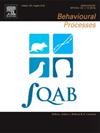Boldness and learning in an active foraging lizard
IF 1.3
4区 生物学
Q4 BEHAVIORAL SCIENCES
引用次数: 0
Abstract
Foraging is a demanding activity for species that search intensively for food, and learning may help them minimise the costs associated with feeding. In different species, there is a relationship between personality (risk-taking) and learning, where bolder individuals learn fast and perform better in stable environments. On the other hand, shy individuals have slower learning rates because they spend more time paying attention to the environment, and their performance peaks under unstable environmental conditions. Therefore, we could expect that these differences will permeate other contexts, such as foraging mode. We evaluated learning and boldness in the active foraging lizard Aspidoscelis costatus costatus to establish if this association is present in reptiles. We found that males and females have similar learning abilities, with bolder individuals learning to find and consume food faster. Females were bolder than males in the presence of a novel object. We suggest that the results are related to the foraging ecology of the species, in which active foragers manifest risky behaviours (i.e. boldness, exploration, and higher activity) to search wide areas for prey, which may be enhanced by faster learning to reduce the costs associated with foraging.
一只活跃的觅食蜥蜴的胆识和学识
对于密集寻找食物的物种来说,觅食是一项要求很高的活动,学习可以帮助它们将与觅食相关的成本降至最低。在不同的物种中,个性(冒险精神)和学习能力之间存在关系,大胆的个体学得更快,在稳定的环境中表现得更好。另一方面,害羞的人学习速度较慢,因为他们花更多的时间关注环境,他们的表现在不稳定的环境条件下达到峰值。因此,我们可以预期这些差异会渗透到其他环境中,比如觅食模式。我们评估了活跃觅食蜥蜴蛛形蜥的学习能力和胆识,以确定这种联系是否存在于爬行动物中。我们发现雄性和雌性有相似的学习能力,更大胆的个体学会更快地寻找和消耗食物。女性在新事物面前比男性更大胆。我们认为,这一结果与该物种的觅食生态有关,在该物种中,活跃的觅食者表现出冒险行为(即大胆、探索和更高的活动),以在更大的区域寻找猎物,这可能通过更快的学习来降低与觅食相关的成本。
本文章由计算机程序翻译,如有差异,请以英文原文为准。
求助全文
约1分钟内获得全文
求助全文
来源期刊

Behavioural Processes
生物-动物学
CiteScore
2.70
自引率
7.70%
发文量
144
审稿时长
4-8 weeks
期刊介绍:
Behavioural Processes is dedicated to the publication of high-quality original research on animal behaviour from any theoretical perspective. It welcomes contributions that consider animal behaviour from behavioural analytic, cognitive, ethological, ecological and evolutionary points of view. This list is not intended to be exhaustive, and papers that integrate theory and methodology across disciplines are particularly welcome.
 求助内容:
求助内容: 应助结果提醒方式:
应助结果提醒方式:


